Understanding the Impact of Structured Settings on Social Development
Center-based Applied Behavior Analysis (ABA) therapy has emerged as a highly effective approach to support social development in children with autism. By providing a consistent, structured environment, these centers create optimal conditions for children to learn, practice, and generalize social skills, which are essential for navigating everyday interactions and building meaningful relationships.
The Role of Structured Environments in ABA Therapy for Social Skills
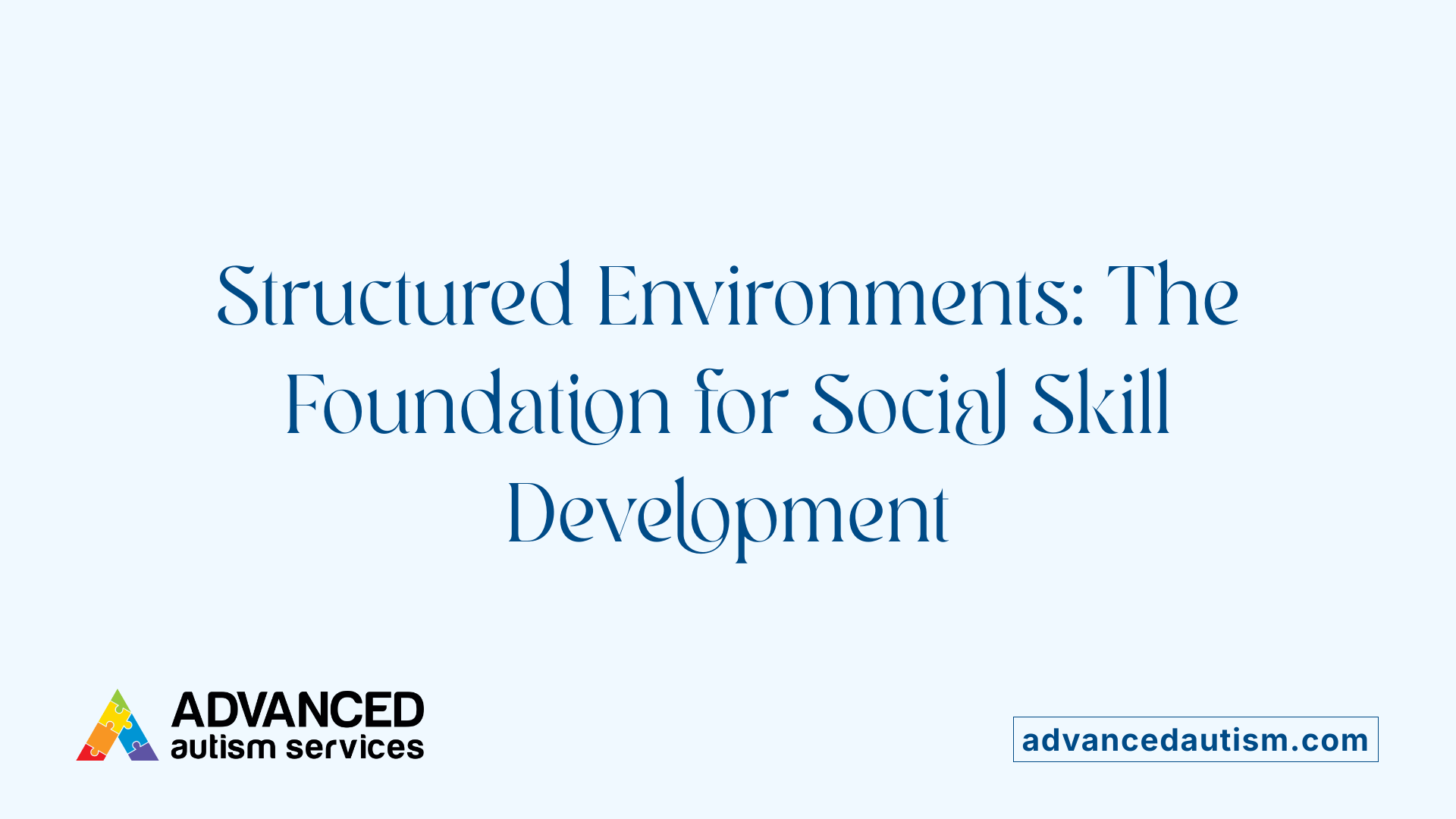
Why are predictable environments important in ABA therapy?
Structured settings in ABA therapy provide a stable and consistent environment that helps children with autism feel safe and supported. When routines and expectations are clear, children can focus more on learning new social skills without feeling overwhelmed or anxious. This predictability encourages engagement and new interactions.
How are social activities like turn-taking and role-plays incorporated?
Activities such as turn-taking games, role-plays, cooperative tasks, and group projects are carefully integrated into the therapy environment. These activities teach essential social skills such as sharing, listening, and understanding others’ perspectives. Role-playing allows children to practice real-life social situations in a safe space.
What stages of social play development are addressed?
Structured environments support each stage of social play, from solitary play to parallel play, and eventually to cooperative play. Early stages, like solitary play, focus on individual skills, while later stages promote working together and teamwork. This gradual progress helps children develop social understanding step-by-step.
How does explicit social-emotional instruction work through programs like CASEL?
Programs such as CASEL provide explicit teaching of social-emotional learning (SEL) skills. Children learn to recognize their own emotions, manage impulses, develop empathy, and establish positive relationships. This instruction is woven into therapy activities, making social skills a core part of daily learning.
Additional benefits of structured ABA therapy environments
Creating safe, engaging, and inclusive settings allows children to practice social behaviors in realistic contexts. Activities like sports, group projects, and classroom-like routines foster teamwork and cultural awareness. These environments also help children generalize skills learned in therapy to real-world situations, laying a foundation for successful social interactions across different settings.
Overall Benefits of Center-Based ABA Therapy on Social Development
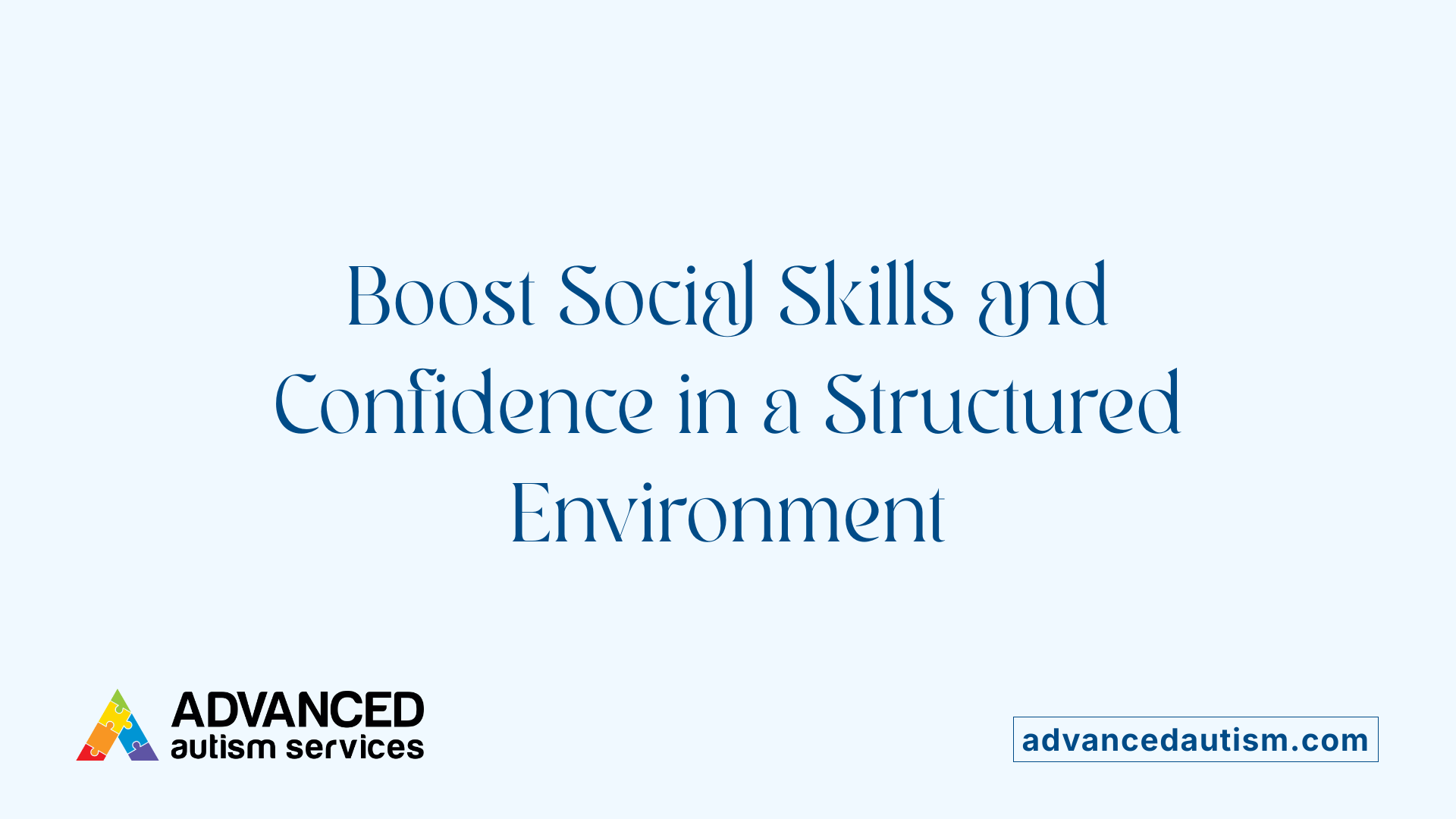
Opportunities for peer interaction
One of the main advantages of center-based ABA therapy is the exposure children have to peers in a structured environment. These centers promote socialization by offering group activities and peer modeling, allowing children to practice social cues like sharing and turn-taking. Such interactions help children with autism develop confidence and better understanding of social norms.
Tailored social skills training and group activities
Therapists at center-based facilities organize specific group exercises focused on social skills. These activities are designed to be engaging and relevant, fostering cooperation and communication among children. Play-based therapy and structured games further support the development of social understanding in a natural, enjoyable setting.
Promotion of communication and cooperation skills
Consistent routines and adult-guided interactions teach children how to communicate effectively. They learn to express needs, respond to others, and work cooperatively in small groups. Trained professionals provide real-time feedback, helping children improve their social responsiveness and relational skills.
Facilitation of skill generalization across settings
Centers create controlled yet flexible environments where children can consistently practice their new skills. By integrating natural environment training and involving multiple therapists, children learn to transfer what they learn in therapy to other places like school or community activities. Family training sessions support long-term generalization at home.
Collaboration with families and professionals
Center-based programs emphasize teamwork among behavior analysts, speech and occupational therapists, and families. Regular communication ensures that interventions are tailored to each child's needs and that progress is monitored closely. Parent training and workshops enable families to reinforce skills and foster development outside of therapy sessions.
| Aspect | Description | Benefits |
|---|---|---|
| Peer Interaction | Group activities and modeling | Increased social confidence and understanding |
| Skill Training | Tailored sessions and play | Improved communication and cooperation |
| Environment | Structured routines and natural settings | Better skill transfer across various settings |
| Family Involvement | Collaboration and parent education | More consistent and sustained development |
Overall, center-based ABA therapy creates an enriching environment that nurtures social growth. Children learn essential social, communication, and cooperation skills that enable them to develop meaningful relationships, both within and outside the therapy setting, ultimately supporting their long-term adaptation and success.
Enhancing Social Skills Through Peer Interaction and Group Activities
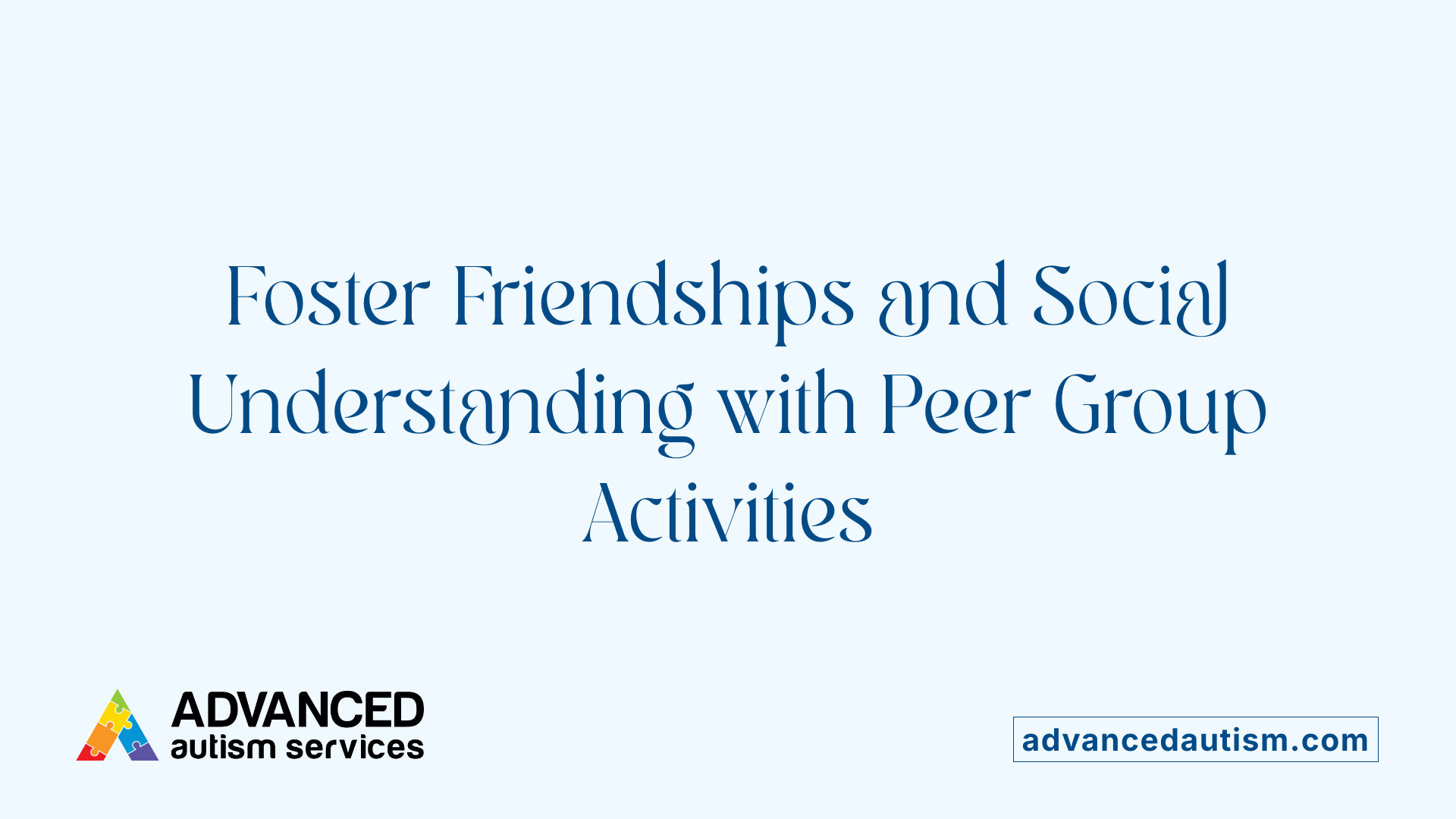
What are the benefits of center-based ABA therapy for social skills development?
Center-based ABA therapy plays a vital role in helping children with autism develop their social skills within a structured and predictable setting. The dedicated environments are designed to promote social growth by offering numerous opportunities for interaction with peers.
One significant advantage is the variety of group activities, such as social skills classes and cooperative play, which encourage children to practice sharing, turn-taking, and understanding social cues. These interactions help children build friendships and boost their confidence in social situations.
Peers serve as excellent models; through imitation and role-playing, children learn appropriate social behaviors in a natural context. This peer modeling fosters not only social imitation but also helps children feel more comfortable engaging with others.
Having access to a team of trained professionals—such as Board Certified Behavior Analysts (BCBAs), speech therapists, and occupational therapists—ensures that interventions are tailored to each child's specific social learning needs. These experts can provide real-time feedback, guidance, and adjustments to therapy plans to optimize social development.
The resources available in centers, including visual aids and communication tools, support learning and help children transfer skills across different settings. Regular progress assessments and goal revisions ensure the continuous growth of social abilities.
Overall, the structured environment, along with diverse social activities and professional support, leads to improvements in communication skills, behavioral flexibility, and general social confidence, paving the way for better integration into school and community life.
Comparison of Center-Based ABA Therapy with Other Settings in Promoting Socialization
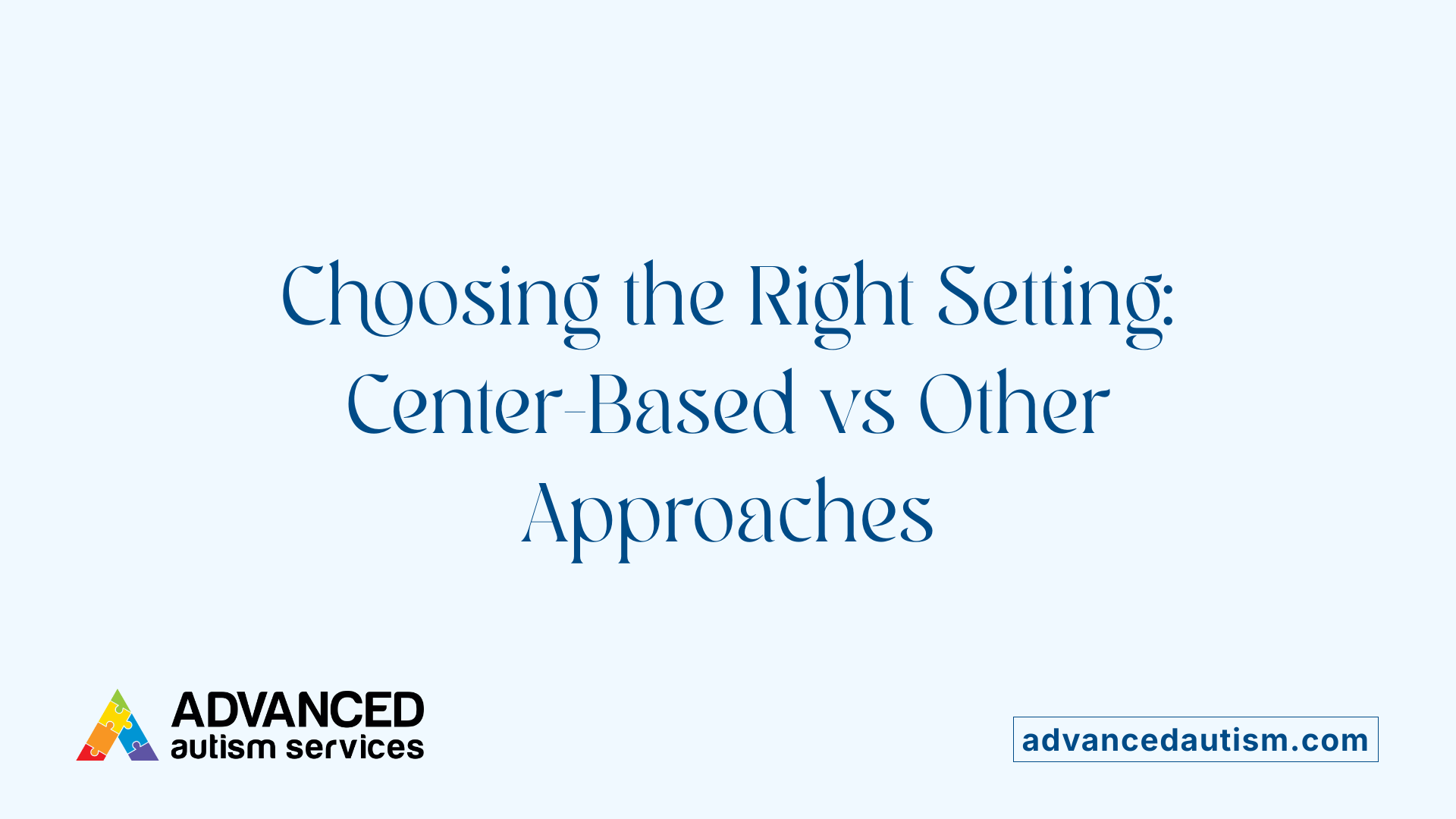
How does center-based ABA therapy compare to other therapy settings in promoting socialization?
Center-based ABA therapy is often regarded as more effective in fostering social skills among children with autism. One reason is the structured environment that naturally encourages peer interactions. Children participating in center programs regularly engage in group activities, social skills classes, and peer modeling, which all contribute to building social competence.
The dedicated spaces and resources in treatment centers, such as play areas, communication tools, and age-appropriate educational materials, create ideal conditions for learning and social engagement. Having a multidisciplinary team—including Board Certified Behavior Analysts (BCBAs), speech therapists, and occupational therapists—ensures personalized and comprehensive support. These professionals work together to promote socialization and help children generalize skills across different environments.
Research highlights the benefits of these settings, showing that children in center-based programs tend to master skills at a faster pace and with higher rates of learning compared to at-home or less structured settings. The immediate access to supervision and real-time feedback allows for quick adjustments to therapy strategies, maximizing the child's development.
Despite these advantages, it is important to recognize that the most suitable therapy setting varies depending on individual needs. Some children may benefit from in-home programs or community-based therapies, especially when family involvement is strong and tailored approaches are used.
In summary, center-based ABA therapy significantly enhances socialization due to its structured, resource-rich environment and professional team, but options should always be tailored to the child's specific situation.
| Setting | Advantages | Considerations |
|---|---|---|
| Center-based | Facilitates peer interaction, structured routines, professional supervision, social skill programs | Cost, accessibility, family involvement needed |
| Home-based | Customized to family routines, family involvement, comfort | Limited peer interaction, fewer resources |
| Community-based | Real-world experiences, community integration | Variable structure, resource availability |
Matching therapy setting to the child's unique needs and family circumstances ensures optimal development and socialization outcomes.
Support for Socialization and Relationship Building in ABA Centers
How does center-based ABA therapy support socialization in children with autism?
Center-based ABA therapy plays a vital role in enhancing social skills among children with autism. These settings feature structured environments designed to encourage social interaction through a variety of activities. Children engage in group activities, such as circle time, arts and crafts, and specialized social skills groups. These activities provide practical opportunities to practice behaviors like turn-taking, sharing, and initiating conversations.
Trained professionals, including Board Certified Behavior Analysts (BCBAs) and therapists, closely oversee these activities. They tailor social interactions to each child's needs, ensuring that progress is steadily monitored and goals are met. Regular feedback and adjustments help children develop communication skills, social awareness, and confidence.
Parent involvement is a crucial component of these programs. Parents receive training and resources to reinforce social skills learned at the center during home activities. This consistency helps children transfer skills across environments, fostering meaningful peer relationships.
By creating a positive, engaging atmosphere where children can interact with peers and adults, center-based programs promote social development. Children learn to navigate social cues, cooperate with others, and form friendships, significantly supporting their overall growth and independence.
The Importance of Multidisciplinary Teams and Resources in ABA Centers
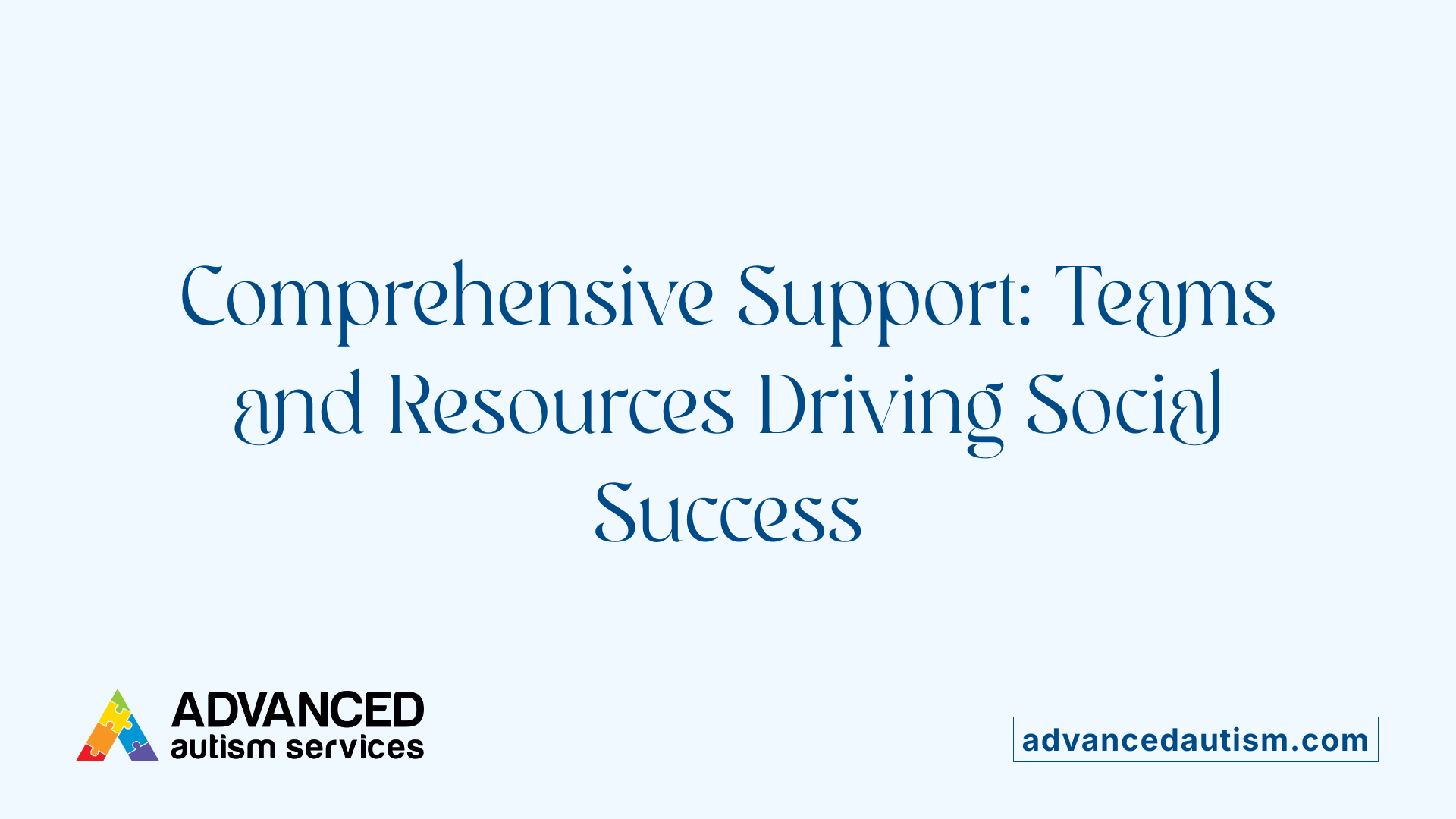
What advantages does center-based ABA therapy have in promoting social interaction and peer learning?
Center-based ABA therapy provides a highly structured setting that encourages children with autism to engage with peers and develop social skills. The presence of other children in group activities creates natural opportunities for peer interaction, imitation, and social learning. Children participate in structured group games, communication exercises, and role-playing activities designed to foster cooperation, sharing, and understanding social cues.
The environment is carefully designed to minimize distractions and ensure routines are consistent, which helps children feel secure and ready to learn social behaviors. Trained professionals facilitate guided interactions, supporting children as they practice taking turns, sharing, and maintaining eye contact. Peer modeling is a common strategy where children observe and imitate appropriate social behaviors, which accelerates social skill acquisition.
Additionally, center-based settings often include specialized tools such as visual supports, communication devices, and educational toys. These resources assist children in understanding social concepts and expressing themselves. The educational environment is tailored to meet individual needs through detailed assessments, ensuring therapy is personalized.
The multidisciplinary team—comprising behavior analysts, speech therapists, occupational therapists, and educators—collaborates to integrate social skill interventions seamlessly. Continuous progress monitoring and data collection allow professionals to adapt strategies promptly, resulting in more effective social development outcomes.
Overall, the combination of skilled staff, peer opportunities, structured routines, and tailored resources makes center-based ABA therapy highly effective in promoting social interaction and peer learning.
Fostering Social Growth Through a Structured Setting
Ultimately, center-based ABA therapy provides an environment specifically designed to foster social growth for children with autism. Its structured routines, skilled multidisciplinary teams, and opportunities for peer engagement create an ideal space for learning, practicing, and generalizing social skills. As research demonstrates the higher rates of skill acquisition and social confidence achieved in these settings, it becomes clear that such environments are integral to the long-term social success and independence of children with autism. Combining therapy with family involvement ensures a comprehensive approach, reinforcing skills learned and supporting sustained social development.
References
- The Benefits of Center-Based Therapy | Shelton, Fairfield County (CT)
- What are the benefits of center-based ABA services
- Top Benefits of Center-Based ABA Therapy: Guide for Parents
- Top 5 Benefits of Center-Based ABA Therapy
- Center-Based Benefits | Ally Behavior Centers
- What Are the Benefits of Center-Based ABA Therapy?
- Center-Based ABA Therapy Advantages for Autism Care
- Exploring Center-Based ABA Therapy's Benefits - All Star ABA



